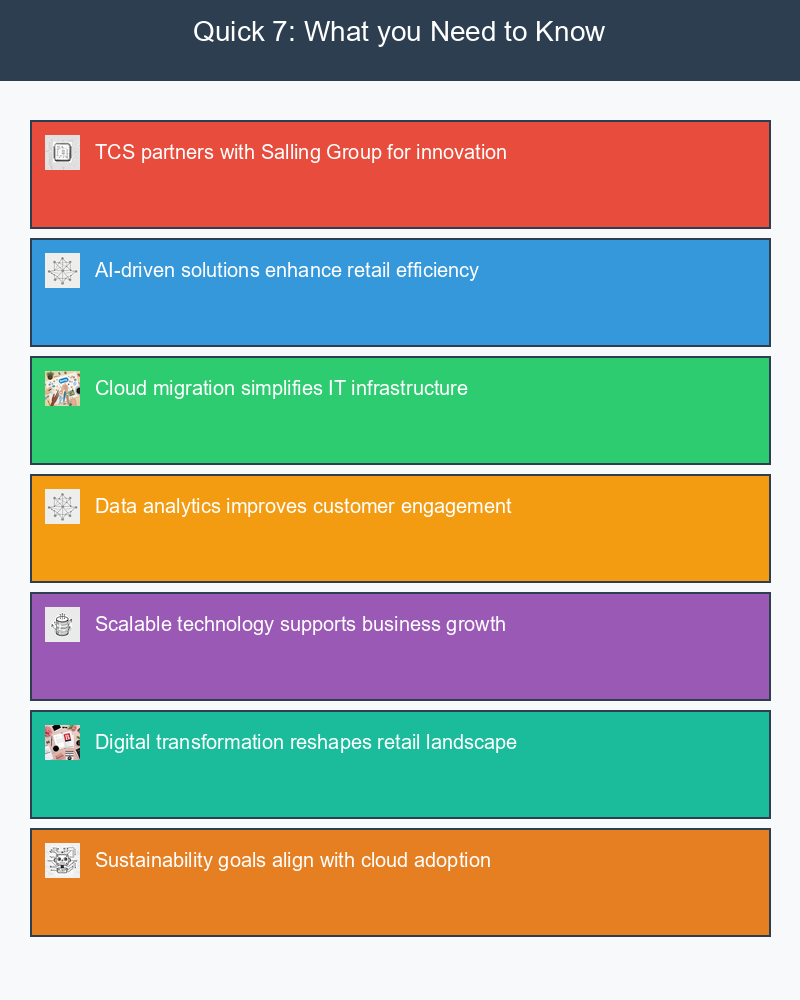Executive Summary: The partnership between Tata Consultancy Services (TCS) and Denmark’s Salling Group represents a significant step towards integrating cloud technology in the retail sector. As businesses increasingly look to digital transformation for enhanced efficiency and customer engagement, TCS’s AI-enabled cloud solutions offer a pathway for retailers to navigate the complexities of modern commerce. This article delves into the implications of cloud adoption for retail, spearheaded by strategic collaborations such as that of TCS and Salling Group.

Background and Context
The retail landscape is evolving rapidly, driven by technological advancements and changing consumer behaviors. The cloud has emerged as a critical enabler of this transformation, allowing retailers to enhance operational efficiency, scalability, and customer engagement. By leveraging cloud infrastructures, businesses can store vast amounts of data, analyze consumer trends in real-time, and optimize supply chain operations.
For technical resources and innovative solutions, please visit EchoesOfCreationUS for specialized technical resources.
TCS’s partnership with Salling Group is not just a transaction; it is a strategic alliance aimed at redefining how retail businesses operate in a digital-first world. With Salling Group’s extensive network of 2,100 stores and 68,000 employees across several countries, the collaboration illustrates the potential of cloud technology to reshape the retail sector.
Current Developments
As part of this partnership, TCS will deploy its AI-enabled cloud operations solution, Cloud Exponence, to facilitate Salling Group’s digital transformation objectives. This initiative is a core component of Salling Group’s ‘Aspire 28’ strategy, which aims to expand its market presence and enhance operational capabilities through technology.
The adoption of cloud technology is particularly relevant for Salling Group as it seeks to improve its e-commerce platforms and respond to the evolving demands of consumers. By integrating TCS’s cloud solutions, Salling Group is positioned to not only streamline operations but also to create a more agile and responsive business model. This reflects a broader trend in the retail industry, where businesses are recognizing the necessity of cloud adoption for maintaining competitiveness.
Discover exclusive offers and premium content at Active Living Offers – your gateway to enhanced productivity and lifestyle solutions.
Analysis and Implications
The partnership between TCS and Salling Group highlights several key implications for the retail industry, particularly in the realm of cloud technology. First, it underscores the importance of digital transformation in meeting customer expectations. In today’s market, consumers demand seamless experiences across physical and digital channels, necessitating robust cloud solutions that facilitate this integration.
Moreover, the use of AI in cloud operations allows retailers to harness data analytics, enabling them to make informed decisions swiftly. By analyzing customer behavior and purchasing patterns, Salling Group can optimize inventory management and enhance personalized marketing strategies, ultimately driving sales and customer loyalty.
Additionally, the focus on sustainability within this partnership reflects a growing awareness among businesses of the need to align with environmental and social governance principles. Cloud technology can contribute to sustainability efforts by optimizing resource usage and reducing the carbon footprint associated with traditional IT infrastructures.
Industry Impact
The collaboration between TCS and Salling Group is emblematic of a larger movement within the retail industry towards cloud adoption. Retailers across the globe are increasingly recognizing the necessity of digital transformation to remain competitive. The pandemic has accelerated this shift, forcing many businesses to rethink their operational strategies and embrace cloud solutions to enhance agility and resilience.
As retailers leverage cloud technology, they can enhance their e-commerce capabilities, streamline operations, and improve customer engagement. This shift not only benefits individual companies but also contributes to a more robust and responsive retail ecosystem. The integration of AI-driven cloud solutions will likely become a standard practice, enabling retailers to deliver personalized experiences and respond swiftly to market changes.
Future Outlook
Looking ahead, the potential of cloud technology in the retail sector is vast. As more retailers embark on digital transformation journeys, the demand for AI-enabled cloud solutions is expected to grow. Companies like TCS that offer innovative cloud services will be at the forefront of this evolution, driving advancements in operational efficiency and customer engagement.
Furthermore, as consumer expectations continue to rise, retailers will need to prioritize agility and responsiveness in their operations. Cloud technology will play a crucial role in facilitating this adaptability, allowing businesses to pivot quickly in response to market trends and consumer demands.
In addition, the emphasis on sustainability will likely shape the future of cloud adoption in retail. As businesses seek to align their strategies with responsible practices, cloud solutions that promote efficiency and minimize environmental impact will become increasingly important.
Conclusion with Key Takeaways
The partnership between TCS and Salling Group serves as a powerful example of how cloud technology is transforming the retail landscape. As retailers strive for digital transformation, the integration of AI-enabled cloud solutions will enhance operational efficiency, improve customer experiences, and promote sustainability.
Key takeaways from this collaboration and its implications for the industry include:
- The necessity of cloud adoption for enhancing operational agility and customer responsiveness in retail.
- The growing trend of partnerships between technology providers and retailers to facilitate digital transformation.
As the retail sector continues to evolve, cloud technology will undoubtedly remain at the forefront of innovation, enabling businesses to thrive in an increasingly digital world.
Disclaimer: The information presented in this article has been gathered from various publicly available sources and is intended for informational purposes only. While we strive to ensure accuracy, we cannot guarantee that all information is current, complete, or error-free. Readers are advised to verify information independently and consult with qualified professionals before making any decisions based on this content. The views and opinions expressed in this article are those of the sources cited and do not necessarily reflect our official policy or position.
